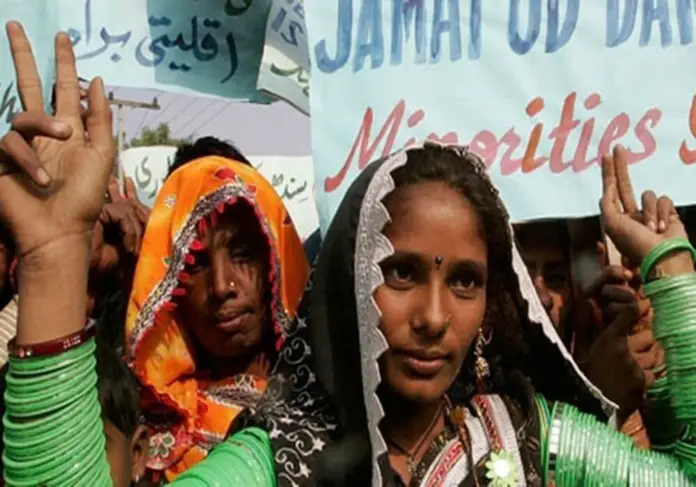The Navaratri festival that is celebrated by the Hindu community across the globe was also observed in Pakistan.
In Hyderabad, Chief Justice of Pakistan (CJP) Justice Gulzar Ahmed was invited by a minority group as the event’s chief guest. And just like any other individual in the power corridors of Pakistan, the CJP made tall claims related to the protection of rights of the minority communities in the country.
Justice Gulzar was right when he said that the constitution guarantees “the rights of all the citizens, including religious minorities”.
Reiterating the words of the founder of Pakistan, Muhammad Ali Jinnah, the CJP said that “all citizens of Pakistan, including minorities, are free to practice their religion”. Ironically, the speech received applause by the very community that has been discriminated against. We have been here before, where words do not match the actions of the state, leaving many to feel abandoned by the very people who have been elected to serve them.
There is no denying the fact that the constitution does provide for religious freedom and harmony. But is the state keeping up with its laws?
Justice Gulzar’s words of affirmation for the Hindu community, comes just two weeks after the Parliamentary Committee to Protect Minorities from Forced Conversions rejected the anti-forced conversion bill. Minister for Religious Affairs and Interfaith Harmony Sahibzada Noorul Haq Qadri said that the passage of the bill could create a law-and-order situation in the country. One may only wonder how protecting those who are already vulnerable further creates unrest. However, it must be noted that the same bill had earlier been rejected by the Ministry of Religious Affairs with some terming it ‘un-Islamic’. All this at a time, when frequent protests are staged by the beleaguered Hindu community in Sindh, whose girls are the ones often abducted, converted to Islam and then married off to their abductor.
The irony is that maintaining religious freedom had been a vision of our founder. It was during the presidential address to the then constituent assembly of Pakistan in August 11, 1947, when Jinnah’s words, “You are free to go to your temples, you are free to go to your mosques or to any other place of worship in this state of Pakistan. You may belong to any religion or caste or creed, that has nothing to do with the business of State,” reverberated across a new country. But around 70 years later, the situation has starkly changed.
Minority communities in some areas are discriminated against, their places of worship vandalized and in worst case, homes put on fire. Let us not forget that on March 2013, an enraged mob set 125 Christian homes on fire in Badami Bagh, Lahore, over alleged blasphemy. A year later, a couple from the same minority group, Shama and Shahzad Masih, were lynched, paraded naked and then set on fire by a mob in Kasur, who had falsely accused them of blasphemy.
But we do not even have to go far to look at the cases of violence against our minority groups. The events of this year are for everyone to see. The Bhong temple attack in August was the eight such attacks in a span of just 18-months. And till date the dispute on the Karak temple, which was attacked and burned in December last year, still exists.
Justice Gulzar too has been unable to amp up efforts of the Evacuee Property Trust Board to return the land of Hindu temples to the community. At the same festival where he said ‘everyone was free’, he also stated that “we will put more efforts to ensure that all such [pieces of] land of the temples [in the country] are returned to Hindu community as per the law”. But when? A question that still has no answers.
The state is failing its minority groups as institutionalized prejudice towards non-Muslims is becoming even more evident. What else can then explain the fact that three out of the four churches along Karachi’s Gujjar Nullah were demolished during the ongoing anti-encroachment drive ordered by the Sindh High Court.
In democracies, all citizens should be able to feel free in the truest sense of the word, just how it has been enshrined in the Constitution. The oppression of one should be condemned by all. Islam too after all, advocates for peace and harmony. Justice Gulzar has his heart in the right place, just as Prime Minister Imran Khan, who laid the foundation of Riyasat-e-Madina last week; a system where minorities are protected. But can they be the change minority groups are yearning for?







